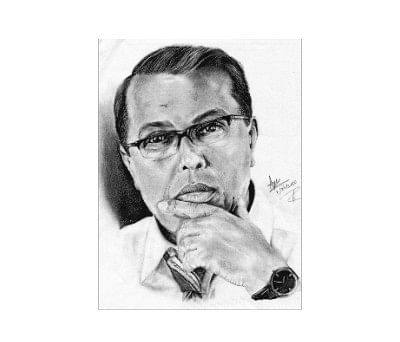Shykh Seraj: Pioneer of a new trend of rural TV journalism

Shykh Seraj, who turned 55 in June, is an innovative and intuitive genius in the mainstream media of Bangladesh. He is best known as an agricultural and environmental journalist, whose versatile works have taken media coverage on agriculture beyond the borders. His outstanding work for more than three decades contributed to agricultural development, sustainable food security, farmers' empowerment and agricultural transformation. This has set a sustained impact on the livelihood of the rural poor. Through the power of the media Shykh Seraj's works also influenced the policy makers in taking proactive interventions for pro-farmer development.
He brings the voices of the poor farmers from every corner of the country to the capital and beyond. He underscores not only the face of disaster-prone Bangladesh, but also those of the resilient and hard working farmers and their immense knowledge to adapt to the varied climatic and farming conditions. He has proven to be a journalist who has facilitated boosting the agricultural development and at the same time upholding the morale of the farmers of Bangladesh. His voice has become the farmers' voice. We, in FAO, were able to analyse in depth his activities and initiatives for the nomination of the 2008 A. H. Boerma Award which was a well-deserved recognition of his work and also an inspiration to the brave farmers, who are the actual beneficiaries of all his achievements. This recognition also opened a window of opportunity to share the experiences of Bangladesh in general, and of Sheikh Seraj in particular, among the farming communities of the world.
Shykh Seraj's camera has not only focused on the domestic scenario, but has also covered the vast canvas of global agriculture. His lens has panned across China, Malaysia, Vietnam, Thailand, Japan, the Philippines, Norway, Sweden, Singapore, Saudi Arabia, UAE, Australia, the USA, Britain, Italy and other countries. He introduced many new agricultural technologies and good farming practices from abroad to Bangladesh and popularised them by his numerous TV programmes and publications. Farmers are becoming aware of the farming standards of a new crop vis a vis their local adaptation techniques through the scientifically designed programmes of Shykh Seraj. When he is unearthing the problems of the farmers, he is also highlighting the success stories. That has inspired other farmers to undertake new ventures and also influenced policymakers to take initiatives and introduce new interventions.
Shykh Seraj's persuasion and endeavour over the years has succeeded in the broadcasting of agricultural news as a regular news item in almost all the TV channels in the country. This is a paradigm shift in a society where agriculture was neglected on the grounds that it was the poor's job. Farmers can join his programmes live from remote areas and put forward real time problems and share the solutions. He has also introduced an "E-Agriculture" initiative to propagate and disseminate agricultural information, reviews, farmers' demands and views through the digital world. This will help modernise agriculture and also minimise the digital divide in the farmers' favour.
With this motto, he has motivated farmers to take up new varieties of rice and other crops, and to practice new technologies. Through his programmes and writings, he continuously fed the farmers with the latest information that acted as an incentive to produce more food. Shykh Seraj has also been wise in covering the agriculture industries and market infrastructures from around the world. This has been a part of the drive to minimise the middleman culture and enable the farmers to obtain the best value for their products in the market. Thus, his work has also contributed significantly to alleviation of poverty.
Shykh Seraj has triggered a silent revolution in agriculture in Bangladesh and his achievements are well recognised at home and abroad. Channel i has excellent staff and crews at all levels and the work morale is very high.

 For all latest news, follow The Daily Star's Google News channel.
For all latest news, follow The Daily Star's Google News channel. 



Comments